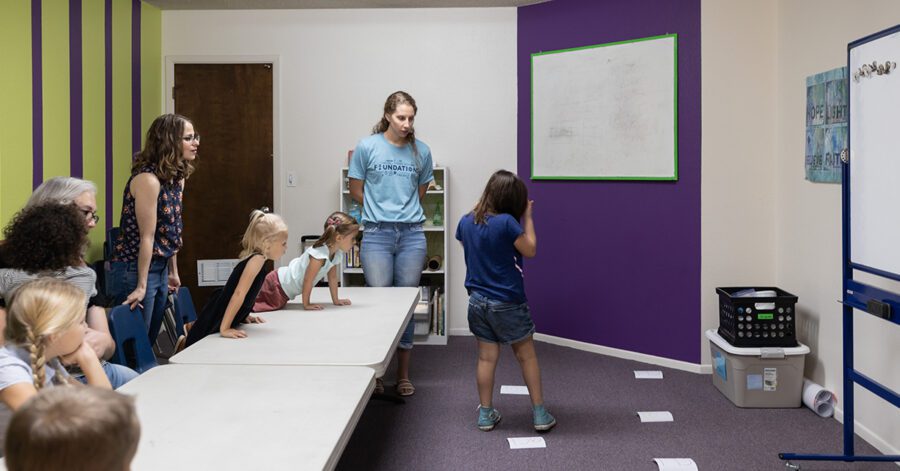Memorizing Latin vocabulary can be fun and engaging when you pair Classical Conversations’ Latin flashcards with active, playful games.
Many homeschool families wonder how to make Latin come alive for young children, who are full of energy and need to move and play. Classical Conversations has developed a classical Christian Latin curriculum designed specifically for homeschool families, complete with beautifully crafted Latin flashcards and games that integrate with Foundations memory work and prepare students for the Challenge grammar strand.
When children jump, draw, and sing their way through Latin words, they’re building classical Latin vocabulary through the skill of Memorization. Here are 10 fun games, developed by Kathy Donegia, the curriculum developer for the Grammar strand at Classical Conversations Multimedia, that are sure to be a hit around your kitchen table.
Fun Latin Learning: From Stairs to Success
Years ago, when my son was full of energy, we lived in a house with a split staircase—5 carpeted steps up to a landing and 7 steps up to the second story. I didn’t dare let him play on the 7 steps, but the 5, well, they were fair game! They became our memory work stairs for history facts, math facts, or anything that required active engagement to learn.
My eager young learner would bound up the steps to reach the first memory work card, flip a card, shout the answer, then jump down to the soft carpet below. Another answer, another jump, again and again, until he reached the landing, then slid down, triumphant. He loved it, and it helped him learn. It was play, not work.
That’s the secret to beginning a journey learning Latin, something that has a reputation for being “serious” and “academic.” However, Latin vocabulary can be wonderfully playful for young children. When you bring out the Latin flashcard games, some creativity, and lean into the natural tendencies of children, learning vocabulary can be fun!
Read Why Learn Latin? The Top 3 Reasons It’s Worth It
Homeschool Latin Activities for Young Learners
Latin Nouns: “Mater is cooking dinner!”
Nouns are a great starting point for young Latin learners because they are concrete things. Children love naming things, even in another language. While Latin is an inflected language (meaning the forms of the words change depending on how they are used in a sentence), for now, just use the vocabulary words as you see them on the flashcards.
Simple examples:
- Mater (Mother) is cooking dinner.
- Agricola (the farmer) plowed his field.
- Equus (the horse) jumped the fence.
Here are some engaging Latin flashcard games that make learning nouns fun and memorable using the Latin Nouns and Pronouns Flashcards set.
Pictionary
Grab a stack of Latin nouns and a piece of paper.
How to play:
- One player picks a card and sketches the noun on paper without using any words
- The others guess the Latin word, not the English one!
- For example, someone might draw a house, and another shout “domus!” (house, home)
Tip: Be sure to choose nouns that are concrete, like window, daughter, star, or cave. The abstract nouns would be difficult to draw. How would you draw fides (faith)? Or vita (life)?
Go Fish
This one is a favorite among children because they love snagging the “fish.”
What you’ll need:
- A paperclip on each flashcard
- A magnet tied to a string and taped to a ruler or stick (your “fishing pole”)
How to play:
- Spread the “fish” (cards) on the floor
- The parent or older sibling calls out a word: “Find terra!”
- The child fishes for the correct card by attaching the magnet to the correct word
- When she catches it, she shouts the word aloud and its English translation for everyone to hear: “I caught terra—earth, land!”
For those Latin scholars out there, yes, you could argue that terra should be terram, accusative case for the direct object. But that’s beyond the scope of fun games for young children. For now, we’re simply linking the English word to the Latin word.
Switcheroo
Challenge your child to use a Latin noun in a sentence, then switch nouns. The sillier, the better!
Examples:
- Mater (Mother) is cooking dinner. > Frater (brother) is cooking dinner. > Bestia (the beast) is cooking dinner. Oh my! What is the beast cooking!
- Equus (the horse) jumped the fence. > Bestia (the beast) jumped the fence. > Esca (the food) jumped the fence. What? Did you see the zucchini jumping the fence? How silly!
The goal in noun games is not translation, but immersion by naming things and playing with words.


Discover Tips for Teaching Latin
Latin Verbs: Action Words for Active Kids
If nouns are about naming, verbs are about doing—and that makes them perfect for active children who need to move. The Latin Verbs and Conjunctions Flashcards set includes verbs like amō (I love), orō (I pray), portō (I carry), and dō (I give).
The great thing about these verbs is that they are already in a form ending in “o” that means “I” am doing something. It’s perfect for acting out! Here are three games that bring verbs to life.
Charades
This game is fun for the whole family.
How to play:
- Shuffle verb cards and allow one person to draw a card and pantomime the action
- The other players try to guess the action by naming the Latin word
What crazy antics might ensue?
- Someone racing around the room? Curro! I run!
- Someone cupping their hand to their ear? Audio! I hear!
- Someone flapping their arms like a bird? Volo! I fly!
Linking physical movement with language strengthens recall and creates fun family memories.
Act it Out!
Flip charades around for a simple activity that is great for getting the wiggles out. Read a Latin verb aloud and have your child shout it out while doing it.
Action ideas:
- Curro! I run! The child runs around the room or the yard.
- Ambulo! I walk! Let’s slow down a little and walk around the room.
- Canto! I sing! Sing one of the Latin memory work songs or the timeline song.
- Adoro! I worship! Open folded hands as if reading the Bible at church.
Try ending with Lego! I read! Then, sit together for a Kings of Rome story.
Latin Larry
Latin Larry is a fun twist on the old hangman game and is a perfect quieter activity.
How to play:
- Start a sketch of Larry by drawing a stick-figure on scrap paper or a whiteboard
- Present a Latin verb flashcard to the child
- If he can give the English meaning, he gets to add clothing or accessories to Larry
- If the child misses the word, have Larry lose something
Creative possibilities:
- Will Larry get his sword and shield today? Whom will he defend?
- Does Larry love his new shield—Amo! (I love!)
- Oops! You dropped your sandals, Larry! Can you curro (run) in your bare feet?
The child’s imagination is the only limit to Larry’s treasures and what he does with them.


Listen to Latin and Other Lessons on the Everyday Educator podcast
Memory Games for Classical Education
Latin Flash Card Games for All Levels
Once your child knows a few nouns and verbs, more challenging games help their vocabulary grow. Combine nouns, verbs, and other parts of speech for more practice. The Latin Adjectives, Adverbs, and Prepositions Flashcards set provides a variety of words to learn.
Beat the Clock
This fast-paced review game is exciting as your child tries to beat her last score.
How to play:
- Place a stack of flashcards on the table and set a timer for one minute
- How many flashcards can she complete before the time ends?
- Award one point per correct answer
- Can she beat yesterday’s score?
Add competition: Have siblings compete against each other with their own set of flashcards. How many of the Challenge student’s flashcards can he do in one minute? How many Foundations Latin flashcards can the younger children do in one minute?
Having each child work through only the cards that they have studied makes the competition equitable for older and younger students to play together. I once did something similar with a summer reading contest, logging pages per week for prizes, where each child chose books at or slightly below their own personal reading level.
Sock Toss
This is a more competitive game that siblings can play together.
How to play:
- Spread the cards out on the floor with the Latin words facing up
- The children take turns tossing a rolled-up sock or bean bag
- Wherever it lands, they must read the word and give the translation
- If they get it right, they get a point and go again
- If they miss, it’s the next person’s turn
Pro tip: You can make this game approachable for different ages by creating zones. An older sibling must toss to the more advanced words farther away. The youngest sibling can choose a word in any zone.
Slap Game
This game is similar to the sock toss, but cards are spread out on a table, English side up.
How to play:
- Call out a Latin word, and the child must slap the card with the correct translation
- Because the “caller” needs to know which Latin words to say, having an older sibling lead this game is a great review for him
- He needs to know the Latin word for each English word he sees on the table in order to call it out for his younger sibling to slap
Conclusion: Make Latin Fun, Make it Stick
Thinking back to those review days on the shorter staircase with my son, I realize how much the lively climbing and jumping helped him focus and memorize. The process of learning felt like playing, not like work.
With Latin, the joy of translating will come later along with charts and grammar rules. For now, make Latin a game. Let your child move, draw, slap, and sing while using Latin words. The Classical Conversations pre-printed flashcards plus a few creative activities make it enjoyable to keep Latin alive in your home.
So, grab your Latin flashcards. Grab a sock. Grab a magnet on a string. And let’s make Latin fun, one jump, laugh, and “Canto!” at a time.





